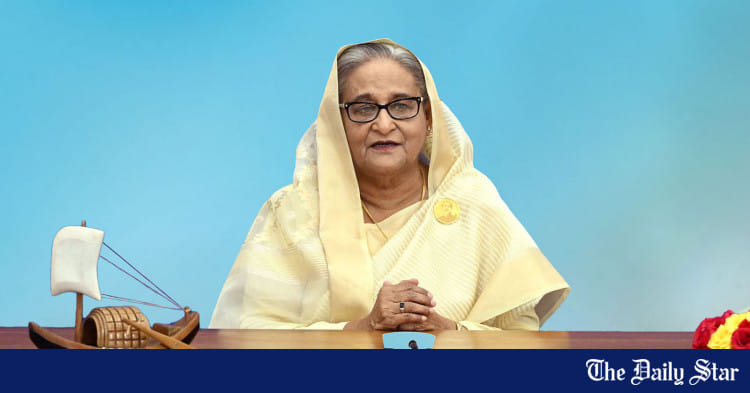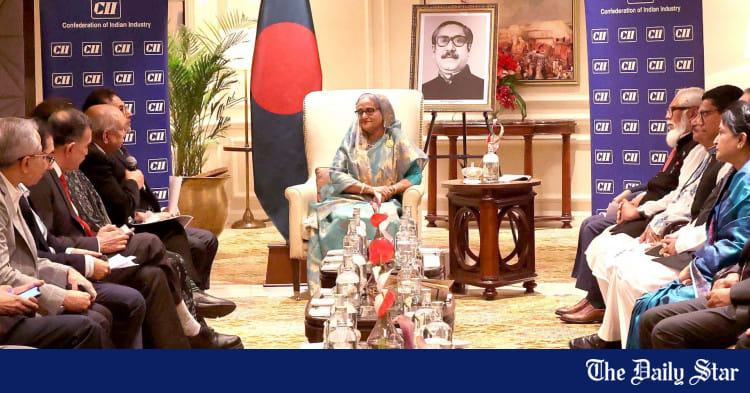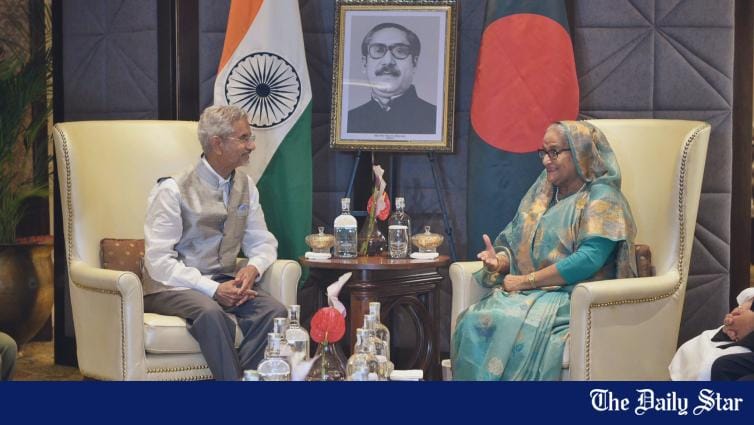Saif
Senior Member
- Joined
- Jan 24, 2024
- Messages
- 17,262
- Likes
- 8,334
- Nation

- Residence

- Axis Group


PM’S India Visit: Defence, Teesta project, port likely to be on agenda
Prime Minister Sheikh Hasina’s upcoming visit to New Delhi on June 21-22 will focus on some key issues in bilateral relations that have regional geopolitical significance.
PM'S India Visit: Defence, Teesta project, port likely to be on agenda
Both sides finalising several deals, MoUs, say diplomatic sources

File photo of PM Sheikh Hasina/PID
Prime Minister Sheikh Hasina's upcoming visit to New Delhi on June 21-22 will focus on some key issues in bilateral relations that have regional geopolitical significance.
Issues such as water, port and defence will be discussed, The Daily Star has learnt from diplomatic sources in Dhaka and New Delhi.
Fresh loans from India under a new framework will also be high on the agenda of the bilateral talks as Bangladesh grapples with a crunch in foreign currency reserves, they said.
Besides, the Myanmar crisis, especially the intense fighting in Rakhine State, will feature prominently during the delegation-level meeting between Hasina and her Indian counterpart Narendra Modi.
The Bangladesh premier is scheduled to reach New Delhi in the afternoon tomorrow. On June 22, she will hold the delegation-level meeting centring on a new phase in the bilateral relationship, a diplomat told The Daily Star yesterday.
The two countries are finalising several agreements and memorandums of understanding that may be signed during Hasina's tour of India.
TEESTA PROJECT
The issue of funding for the "Teesta River Comprehensive Management and Restoration Project" will feature prominently in the talks, according to diplomatic sources in Dhaka and New Delhi.
The agreement was finalised in 2011, but could not be inked due to opposition from West Bengal.
The Economic Relations Division sought a $983.27 million loan from China to implement the Teesta project, which includes river dredging, setting up reservoirs and building townships along the river.
On October 13, 2022, then-Chinese ambassador to Bangladesh Li Jiming said his country was serious about implementing the project, but also had a sense of reluctance due to sensitive issues surrounding it.
During a visit to Dhaka on May 9, Indian Foreign Secretary Vinay Mohan Kwatra told Foreign Minister Hasan Mahmud that India was interested in financing the Teesta project.
On June 13, Hasina told the parliament that the government was considering a proposal for a detailed feasibility study for the Teesta project as China's evaluation pointed out that there was a lack of detailed proposals on land development and water navigation.
"Our government needs to know whether India would sign the Teesta water sharing agreement because the river restoration and management project would depend on this," said Faiz Ahmad, a former ambassador of Bangladesh to China.
India and China also can fund different components of the project, said Ahmad, also a former chair of the Bangladesh Institute of International and Strategic Studies.
A diplomat in New Delhi said the two prime ministers will also discuss the renewal of the Ganges Water Sharing Treaty that was signed in 1996. The treaty is set to expire in 2026.
To be continued.............
Both sides finalising several deals, MoUs, say diplomatic sources
File photo of PM Sheikh Hasina/PID
Prime Minister Sheikh Hasina's upcoming visit to New Delhi on June 21-22 will focus on some key issues in bilateral relations that have regional geopolitical significance.
Issues such as water, port and defence will be discussed, The Daily Star has learnt from diplomatic sources in Dhaka and New Delhi.
Fresh loans from India under a new framework will also be high on the agenda of the bilateral talks as Bangladesh grapples with a crunch in foreign currency reserves, they said.
Besides, the Myanmar crisis, especially the intense fighting in Rakhine State, will feature prominently during the delegation-level meeting between Hasina and her Indian counterpart Narendra Modi.
The Bangladesh premier is scheduled to reach New Delhi in the afternoon tomorrow. On June 22, she will hold the delegation-level meeting centring on a new phase in the bilateral relationship, a diplomat told The Daily Star yesterday.
The two countries are finalising several agreements and memorandums of understanding that may be signed during Hasina's tour of India.
TEESTA PROJECT
The issue of funding for the "Teesta River Comprehensive Management and Restoration Project" will feature prominently in the talks, according to diplomatic sources in Dhaka and New Delhi.
The agreement was finalised in 2011, but could not be inked due to opposition from West Bengal.
The Economic Relations Division sought a $983.27 million loan from China to implement the Teesta project, which includes river dredging, setting up reservoirs and building townships along the river.
On October 13, 2022, then-Chinese ambassador to Bangladesh Li Jiming said his country was serious about implementing the project, but also had a sense of reluctance due to sensitive issues surrounding it.
During a visit to Dhaka on May 9, Indian Foreign Secretary Vinay Mohan Kwatra told Foreign Minister Hasan Mahmud that India was interested in financing the Teesta project.
On June 13, Hasina told the parliament that the government was considering a proposal for a detailed feasibility study for the Teesta project as China's evaluation pointed out that there was a lack of detailed proposals on land development and water navigation.
"Our government needs to know whether India would sign the Teesta water sharing agreement because the river restoration and management project would depend on this," said Faiz Ahmad, a former ambassador of Bangladesh to China.
India and China also can fund different components of the project, said Ahmad, also a former chair of the Bangladesh Institute of International and Strategic Studies.
A diplomat in New Delhi said the two prime ministers will also discuss the renewal of the Ganges Water Sharing Treaty that was signed in 1996. The treaty is set to expire in 2026.
To be continued.............





































